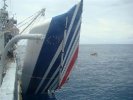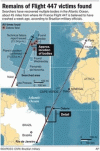Re: Air France Plane Goes Down Over Atlantic
And I suppose for the authorities to publicly consider a possible meteor strike would be opening an unnecessary can of worms...
[quote author=Gimpy]
I also don't trust any info coming from the authorities. When they say there was no Mayday, it doesn't mean there was no Mayday, it means they say there was no Mayday, and that goes for 'discovered bodies' to floating debris or no debris and every bit of disclosed info with regards to this event and every other news event and topic. One can only wonder with all the garbage we are being fed.
I also noticed early on how Brazilian authorities confidently announced that they don't foresee much difficulty in finding the black box and how they could pinpoint the general location where the plane went down, and how quickly that changed to "uneven seabed 3 km down below", "very remote chance", "stormy seas", "very large area to cover".
We went from:
_http://www.livemint.com/2009/06/03101025/Brazil-finds-Air-France-wrecka.html
to:
Air France black boxes 'may never be found'
and:
_http://www.mg.co.za/article/2009-06-04-mystery-deepens-over-missing-air-france-jet
And we went from:
_http://www.livemint.com/2009/06/03101025/Brazil-finds-Air-France-wrecka.html
to:
_http://www.mg.co.za/article/2009-06-06-brazil-crews-struggle-to-gather-plane-wreckage
So airplane seats, wiring, pieces of metal and fuel stains became a wooden pallet and sea trash...mmmmmm
And I suppose for the authorities to publicly consider a possible meteor strike would be opening an unnecessary can of worms...
[quote author=Gimpy]
[/quote]According to Amaral, search crews also found a suitcase that contained a ticket for the flight.
I also don't trust any info coming from the authorities. When they say there was no Mayday, it doesn't mean there was no Mayday, it means they say there was no Mayday, and that goes for 'discovered bodies' to floating debris or no debris and every bit of disclosed info with regards to this event and every other news event and topic. One can only wonder with all the garbage we are being fed.
I also noticed early on how Brazilian authorities confidently announced that they don't foresee much difficulty in finding the black box and how they could pinpoint the general location where the plane went down, and how quickly that changed to "uneven seabed 3 km down below", "very remote chance", "stormy seas", "very large area to cover".
We went from:
_http://www.livemint.com/2009/06/03101025/Brazil-finds-Air-France-wrecka.html
Brazilian president Luiz Inacio Lula da Silva said he was confident that the black boxes would be found.
“I think a country that can find oil 6,000 meters under the ocean can find a plane 2,000 meters down,” he told reporters in Guatemala, referring to recent oil finds by Brazil’s state energy company in ultra-deep waters.
The recorders are designed to send homing signals for up to 30 days when they hit water, but many do not float well.
to:
Air France black boxes 'may never be found'
and:
_http://www.mg.co.za/article/2009-06-04-mystery-deepens-over-missing-air-france-jet
It would be extremely difficult -- maybe impossible -- to recover them even if the 200km wide search area were narrowed down, experts said.
And we went from:
_http://www.livemint.com/2009/06/03101025/Brazil-finds-Air-France-wrecka.html
Airplane seats, an orange buoy, wiring, pieces of metal and fuel stains were spotted in the water by Brazilian air force pilots about 1,200 km northeast of the coastal city of Recife.
to:
_http://www.mg.co.za/article/2009-06-06-brazil-crews-struggle-to-gather-plane-wreckage
Teams had earlier pulled out a wooden pallet that appeared to be part of the plane, but later said it was marine trash.
So airplane seats, wiring, pieces of metal and fuel stains became a wooden pallet and sea trash...mmmmmm


